英语听力——赵建昆英语四级新东方网络课程笔记
- 格式:pdf
- 大小:245.34 KB
- 文档页数:9
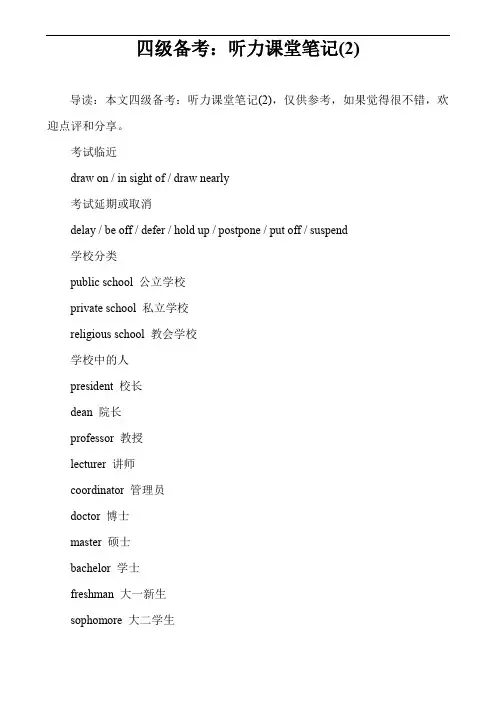
四级备考:听力课堂笔记(2)导读:本文四级备考:听力课堂笔记(2),仅供参考,如果觉得很不错,欢迎点评和分享。
考试临近draw on / in sight of / draw nearly考试延期或取消delay / be off / defer / hold up / postpone / put off / suspend学校分类public school 公立学校private school 私立学校religious school 教会学校学校中的人president 校长dean 院长professor 教授lecturer 讲师coordinator 管理员doctor 博士master 硕士bachelor 学士freshman 大一新生sophomore 大二学生junior 大三学生senior 大四学生图书馆借书lend / borrow / check out 参考书reference book续借renew过期overdue还书return罚金fineattend / have a lecture 上课cut a class 逃课miss a class 错过了课scholarship 荣誉奖学金assistantship 助教奖学金teaching assistant 助教research assistant 助研semester 学期2.交通运输场景fare 车票licence 驾照rush hours 高峰时间traffic jam 交通堵塞overtake 超车one way street 单行道over speed 超速police officer 交警ticket 罚单fine 罚金fast way / express way / high way 高速公路motor way 机动车道super way 飞机机动车道free way 免费高速公路。
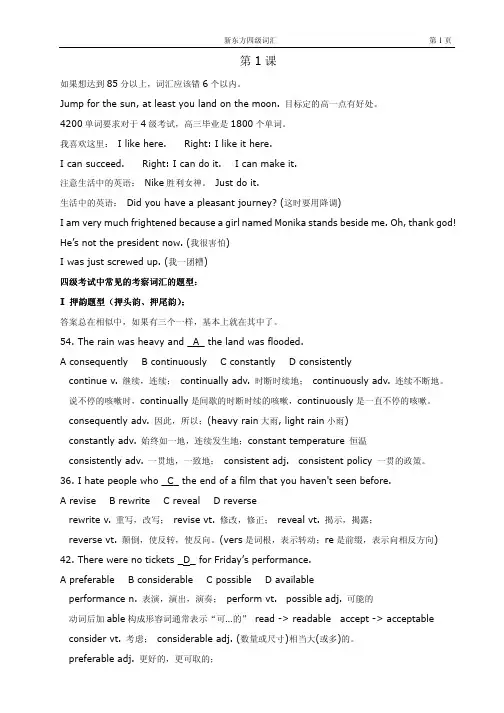
第1课如果想达到85分以上,词汇应该错6个以内。
Jump for the sun, at least you land on the moon. 目标定的高一点有好处。
4200单词要求对于4级考试,高三毕业是1800个单词。
我喜欢这里: I like here. Right: I like it here.I can succeed. Right: I can do it. I can make it.注意生活中的英语: Nike 胜利女神。
Just do it.生活中的英语: Did you have a pleasant journey? (这时要用降调)I am very much frightened because a girl named Monika stands beside me. Oh, thank god! He’s not the president now. (我很害怕)I was just screwed up. (我一团糟)四级考试中常见的考察词汇的题型四级考试中常见的考察词汇的题型::I 押韵题型押韵题型((押头韵押头韵、、押尾韵押尾韵)); 答案总在相似中,如果有三个一样,基本上就在其中了。
54. The rain was heavy and _A_ the land was flooded.A consequentlyB continuouslyC constantlyD consistentlycontinue v. 继续,连续; continually adv. 时断时续地; continuously adv. 连续不断地。
说不停的咳嗽时,continually 是间歇的时断时续的咳嗽,continuously 是一直不停的咳嗽。
consequently adv. 因此,所以;(heavy rain 大雨, light rain 小雨)constantly adv. 始终如一地,连续发生地;constant temperature 恒温consistently adv. 一贯地,一致地; consistent adj. consistent policy 一贯的政策。
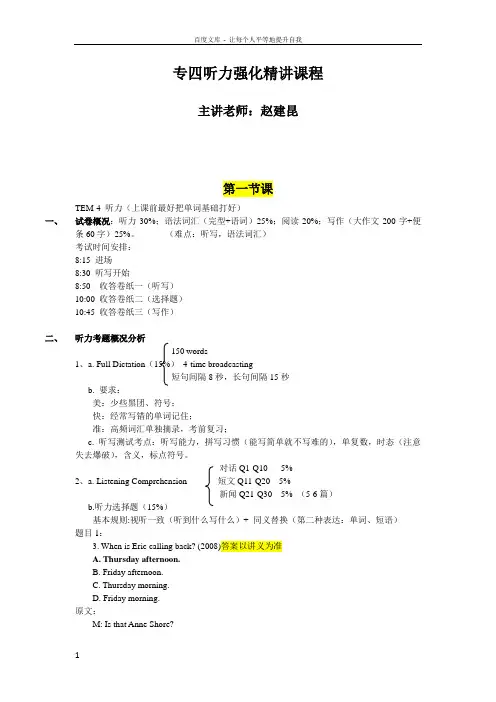
专四听力强化精讲课程主讲老师:赵建昆第一节课TEM-4 听力(上课前最好把单词基础打好)一、试卷概况:听力30%;语法词汇(完型+语词)25%;阅读20%;写作(大作文200字+便条60字)25%。
(难点:听写,语法词汇)考试时间安排:8:15 进场8:30 听写开始8:50 收答卷纸一(听写)10:00 收答卷纸二(选择题)10:45 收答卷纸三(写作)二、听力考题概况分析150words1、a. Full Dictation(15%)4-time broadcasting短句间隔8秒,长句间隔15秒b. 要求:美:少些黑团、符号;快:经常写错的单词记住;准:高频词汇单独摘录,考前复习;c. 听写测试考点:听写能力,拼写习惯(能写简单就不写难的),单复数,时态(注意失去爆破),含义,标点符号。
对话Q1-Q10 5%2、a. Listening Comprehension 短文Q11-Q20 5%新闻Q21-Q30 5% (5-6篇)b.听力选择题(15%)基本规则:视听一致(听到什么写什么)+ 同义替换(第二种表达:单词、短语)题目1:3. When is Eric calling back? (2008)答案以讲义为准A. Thursday afternoon.B. Friday afternoon.C. Thursday morning.D. Friday morning.原文:M: Is that Anne Shore?W: Yes, speaking.M: Hello, it's Eric from London.W: Hello, Eric, How can I help you?M: I'm fixing up our next project team meeting, and I just want to cheek some possible dates with you.W: Fine, let me just get my diary. Ok, which dates are you looking at?M: I've spoken to the others, and they prefer either the third week of May or the second week of June (1).W: Yes, both of those weeks are pretty clear at the moment except for the eleventh of June.M: Right, I've got that.W: So where is the meeting taking place this time?M: It was going to be in London. But I spoke to Carlos in Mexico City and he suggested Chicago (2). He thinks it would be more convenient for most of the team.W: He's probably right. It would certainly be much easier for me as well. Because I can fly from Toronto, and I'm sure you could find a meeting room somewhere near the airport.M: That's a good idea. I'll check up some hotels in that area and get back to you towards the end of the week.W: Fine, but I'm not in the office on Friday.M: Ok, I'll call you later in the afternoon on Thursday (3).W: No problem. Bye.题目2:11. According to the passage, the average age of the fleet of Delta/Northwest is _______ (2011)A. 10 years.B. 14 years.C. 16 years.D. 20 years.原文:Few people expect luxury while flying, but these days, even the basic seems to be in bad shape. It’s not our common to find your trade table broken, the in-flight entertainment system not working and your seat cushion worn. All of these can make you think how old this plane is anyway.The reality for many US air travelers is the most of the journeys take place some planes that have been in service for a decade or more. The average age of the fleet of the seven large USA passenger airlines is about 14 years old according to the airline monitor.If found American and Delta Northwest have the oldest fleets at about 16 years on average.答案:C题目3:23. Under the national oil law, the Iraqi government _______. (2008)A. will give more oil revenues to only a few provincesB. will let provinces distribute their oil revenuesC. will distribute oil revenues according to population sizeD. will distribute oil revenues according to security needs24. The construction package is meant to _______.A. help build more housesB. help improve the country's economyC. help more children to go to schoolD. help more young people to get education原文:US President George W. Bush will lay out his new policy for Iraq Wednesday night in a TV speech. However, some details of the policy have been leaked to the media.National oil law: a date is to be announced for the release of a national oil law in Iraq. The law will give the Iraqi central government the power to distribute current and future oil revenues to provinces and regions based on the population size (23). The achievement of a fair distribution of oil revenue is seen as a comer stone of Iraqi security.More troops: the US now has 132, 000 troops in Iraq. The number will be temporarily increased by 20, 000. A renewed construction package costing up to 1 billion US dollars is also to be announced. The money is to help create jobs and boost the Iraqi economy (24). Young Iraqis are to be encouraged to participate in the country's reconstruction by cleaning the streets and repairing schools.答案:C D注意:24题选项中的“package”:后方是虚拟的名词形式,表示“计划”,例如economic package;后方是具体名词,表示“包裹”。
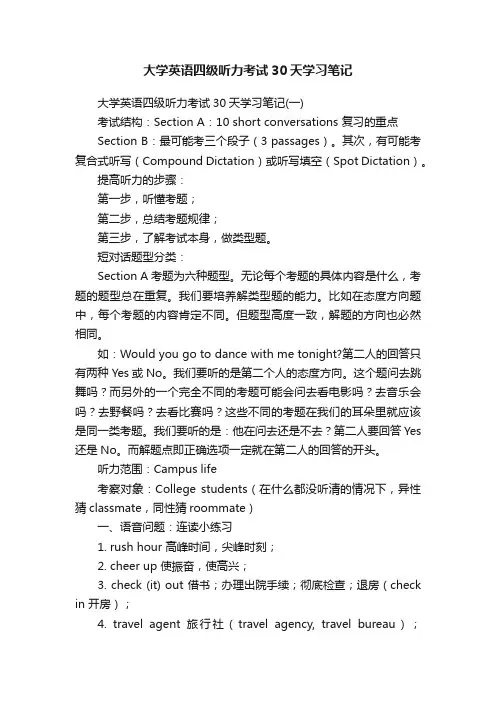
大学英语四级听力考试30天学习笔记大学英语四级听力考试30天学习笔记(一)考试结构:Section A:10 short conversations 复习的重点Section B:最可能考三个段子(3 passages)。
其次,有可能考复合式听写(Compound Dictation)或听写填空(Spot Dictation)。
提高听力的步骤:第一步,听懂考题;第二步,总结考题规律;第三步,了解考试本身,做类型题。
短对话题型分类:Section A考题为六种题型。
无论每个考题的具体内容是什么,考题的题型总在重复。
我们要培养解类型题的能力。
比如在态度方向题中,每个考题的内容肯定不同。
但题型高度一致,解题的方向也必然相同。
如:Would you go to dance with me tonight?第二人的回答只有两种Yes或No。
我们要听的是第二个人的态度方向。
这个题问去跳舞吗?而另外的一个完全不同的考题可能会问去看电影吗?去音乐会吗?去野餐吗?去看比赛吗?这些不同的考题在我们的耳朵里就应该是同一类考题。
我们要听的是:他在问去还是不去?第二人要回答Yes 还是No。
而解题点即正确选项一定就在第二人的回答的开头。
听力范围:Campus life考察对象:College students(在什么都没听清的情况下,异性猜classmate,同性猜roommate)一、语音问题:连读小练习1. rush hour 高峰时间,尖峰时刻;2. cheer up 使振奋,使高兴;3. check (it) out 借书;办理出院手续;彻底检查;退房(check in 开房);4. travel agent 旅行社(travel agency, travel bureau);financial aid 经济资助;5. turn down 关掉,拒绝;turn on 打开二、口语问题:注意语气,语调,语汇。
例如:1. tape 胶带;cassette 磁带。
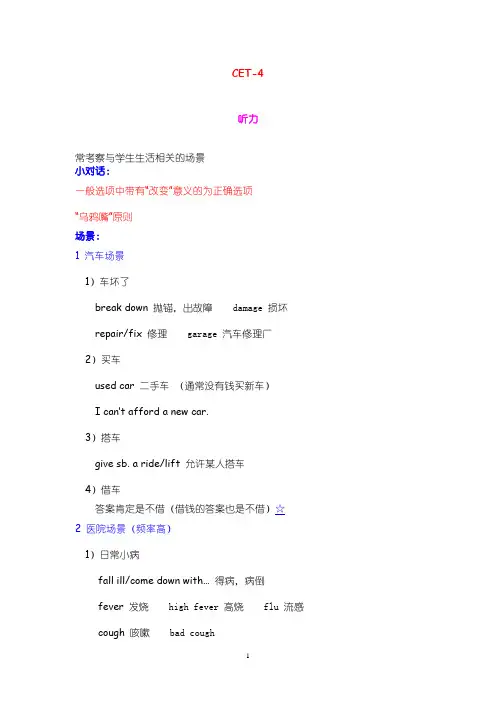
CET-4听力常考察与学生生活相关的场景小对话:一般选项中带有“改变”意义的为正确选项“乌鸦嘴”原则场景:1 汽车场景1)车坏了break down 抛锚,出故障 damage 损坏repair/fix 修理 garage 汽车修理厂2)买车used car 二手车(通常没有钱买新车)I can’t afford a new car.3)搭车give sb. a ride/lift 允许某人搭车4)借车答案肯定是不借(借钱的答案也是不借)☆2 医院场景(频率高)1)日常小病fall ill/come down with… 得病,病倒fever 发烧 high fever 高烧 flu 流感cough 咳嗽 bad coughheadache 头疼 dizzy 头晕 cramp 抽筋worn out 精疲力尽,浑身乏力twist one’s ankle 扭脚2)治疗手段take pills 服药 give sb. a shot 打针injection 注射 injection room 注射室prescription 处方3)治愈get over 恢复;克服 check out 治好,出院☆3 选课,退课场景course 课程1)选课选课不要选太多sign up for…/register for… 登记报名选课2)退课drop out of the school/drop school 辍学☆4 偶遇场景What a small place it is! 遇到不想见的人What luck running into you! 见到你真走运Fancy meeting you here. 真没想到在这遇到你Long time no see. 好久不见☆5 餐馆场景menu 菜单 dessert 甜点 soup 汤 snack 快餐apple pie 苹果派(听到就选“好吃”)pizza (听到就选“难吃,恶心”)go Dutch AA制=divide=go fifty and fiftyfull=be stuffed 饱了☆6 减肥场景gain weight/put on weight 体重增加lose weight/take off weight 体重减轻fat 肥(贬义) heavy/overweight/plump 丰满thin 瘦(贬义) slim 苗条,修长☆7 找工作场景思路:1)找到工作高兴2)失去工作伤心,跳槽也一样3)拒绝工作令人奇怪信息来源:classified ads 分类广告help and wanted section 供需关系栏打电话:Is the position still available?面试:interview resume 简历letter of application 申请fill in/out the form 填表☆8 论文场景paper,essay,thesis1) 论文难写2)打印错误多3)论文需要反复修改4)资料难查找5)选题困难☆9 锻炼身体场景morning exercise keep/stay fit 保持身体健康physical exercise as fit as a fiddle 身体健康in good/bad shape 身体好/不好☆10 打工场景1)teaching assistant (T.A.) 助教research assistant (R.A.)2) 商业部门餐馆 dish washing cook/chef 厨师商店 deliver the goods 送货3)house-sitting 看房子☆11 紧张场景原因:要考试,要发言(presentation, speech),要发奖学金(scholarship)表示紧张的词语:nervous, can’t sit still, be on edge, get cold feet, toss and turn, like a cat on hot bricks, on pins and needles☆12 天气场景1)单纯谈天气,天气将会继续恶化,变糟2)天气与户外活动有关:天气改变,原定户外活动取消3)天气和衣服有关相关短语:keep up, clear up, warm up, let up(雨慢慢减小了), forecast☆13 教师评价场景(议论老师)1)老师要求严A 准时上课 never late punctual 准时的B 经常拖堂 run late, run overtimeC 作业多,考试给分低2)老师讲课讲的好(少考)fascinating 非常好3)老师讲课讲得不好(常考)A 老师讲课没意思 boring, drop offIn his class, everybody becomes a clock watcher/ is watching his clock.B 老师讲课难,听不懂I can’t catch/follow…I am at sea. 迷茫,不知所措C 老师讲课太快,跟不上4)老师忙 office hour 坐班☆14 机场场景1)由于某种原因赶不上飞机:换票,换航班 switch2)由于某种原因机场关闭或航班延误,问什么时候恢复正常一般为天气或机械故障3)提问对话发生地点和说话人身份,熟悉常用词land, take off, board 登机,transfer 转机☆15 住房场景1)谈论租房女生为房东,男生为房客2)布置房子 furnish打扫,刷墙(请人刷) have it painted买家具(通常为second hand)dirt cheap 便宜3)抱怨房子A 房子小 I can hardly turn in my room.B 房子差C 相处难(合租)自己爱干净,室友dirty, messy自己爱安静,室友noisy☆16 书店场景1)有书还是没书in stock 有 out of stock 没有2)印还是不印in print 印 out of print 不印,绝版3)平装或精装paper back/cover 平装 hard back/cover 精装☆题型:1 意义解释题选项特征:选项基本为长句,主语基本相同What do you know from the conversation?What does … mean?重复原词越多的选项越有可能错(听到什么不选什么)考法:1)词义解释题:如果问原因要找根本原因2)词组意义解释题3)句子的意义解释题否定句:A) I can’t agree wi th you more/less.再同意不过了/根本不同意最后一个单词表示多、好、积极,表示肯定的意思最后一个单词表示少、坏、消极,表示否定的意思I can’t feel better/worse.B)Isn’t he?-He’s a disgusting man.-Isn’t he?否定的问句,不管多长,永远表示肯定C)He is anything but a man.He is nothing but a man.anything but 决不是(no/never)noting but 只不过(only)比较句:A)more … than = not as … as …B) nothing better than =only (肯定的最高级)I like nothing better than English.C)the last 否定的最高级You are the last person I want to see.D) 虚拟语气I wish/hope …在选项中找听到句子虚拟部分的否定形式If only … 要是…该多好(同上)2 细节混淆题选项:时间列举,人物,兴趣爱好,物品名称,地点列举边听边选,做记号3 人物动作行为题选项特点:选项为动词原形或带to的不定式考点:抓住动词4 对话发生地点题选项特征:介词+地点名词考法:对话直接提到的推理得出的将要去哪5 人物职业身份题选项特征:4个选项全都是职业名称What does the man do?Who do you think the man is?解题方法:通过线索词(信号词)/通过语气6 人物关系题选项特征:全部为职业+职业的组合What is the most probable relationship between the two speakers? 解题方法同上7 数字价格计算题选项特征:全部为数字+名词的组合1)表示和差倍数关系的关系词和固定搭配:double 双倍 divide 除buy sth. at … discount/knock 10% off the price 降价2)熟悉读法8 时间加减运算题选项特征:4个选项都是时间注:同义替换decade十年 fortnight 两周a few days ago=the other day 几天前最常出现的提前/推后的表达:提前:20 minutes early/ahead of time/ahead of schedule/in advance 推后:20 minutes late/behind time/behind schedule /to be delayed/postponedput off 20 minutes9 对话主旨题选项特征:选项全都是名词或动名词结构What are they talking about/discussing?尽量回忆第一个人说的话☆其他:1 表示费用的词语tip 小费 rent 租金 postage 邮资 fee 停车费,…费 fare 车马费,车船费 train fare admission 入场费 admission free 免费入场utilities 水电费toll 高速公路的收费站fine 罚款allowance 零花钱 tuition 学费2 电影类型horror film 恐怖片 thriller 惊险片science-fiction 科幻片 comedy 喜剧tragedy 悲剧 love story/romance 爱情文艺片art music 艺术片 epic film 史诗片western film 西部片 Kong Fu film 功夫片,武打片detective film 侦探片 cartoon/animation 动画片disaster film 灾难片 silent film 无声电影3 如何看选项1)注意意思上截然相反的两个选项,正确选项一般是其中一个2)注意结构上相似的两个选项,句子结构基本相同,只有一两个单词不同,正确选项一般是其中一个3)注意选项中的同形异义词或同音异形词,正确选项一般在其中4)注意选项中的人名和地名5)注意选项中的时间和数字6)注意排除含有表示范围的词语的选项only, each, every, all, any 只有在表示范围时才是错误选项7)注意排除表示绝对意思的选项absolutely, definitely, certainly8)注意排除有语言错误的选项4 言外之意题What does the man imply? What can we infer?选项特征:重复原词越多,越有可能是错误选项(越像越不是,越不像越是)☆Passage: 任何文章的开头和结尾必考考点:数字,时间,年代,地点如何看短文:1)听到什么选什么,尤其适用于说明文和议论文(选项动词为现在时一般为说明文和议论文)2)日常生活原则:根据常识选择原则:1)人名原则:出现人名的地方可能是考点2)数字原则3)因果原则:至少有2题为因果题,注意标志词原因:because, since, due to, thanks to, owing to结果:so, therefore, thus, consequently4)转折原则:注意转折连词but, however, yet, in fact, actually, to be frank, frankly speaking5)强调原则:A.语义的强调 remember, be sure, 最高级B.举例强调6)重复原则:包含有听到重复最多的单词的选项为正确选项7)建议原则:说明文及议论文中较多I suggest…, You should do…, Why not…? If I were you…8)问答原则:自问自答,答的部分是考点9)开头原则:文章前一两句10)尾巴原则题型&提问方式:1 中心思想归纳题What’s the main idea…? What can we learn…?利用重复原则2 事实和细节题3 正误判断题Which of the following is (not) true?4 词语解释题5 观点和态度题环境问题必问的3个问题:1 环境到底出了什么问题(答案在前3句)2 这个问题的起因是什么3 解决问题的方法是什么☆Compound dictation:1-7空每空填一词,每词0.5分,8-10空填长句(由2-3句组成),写出的句子与原句意思相同即可。
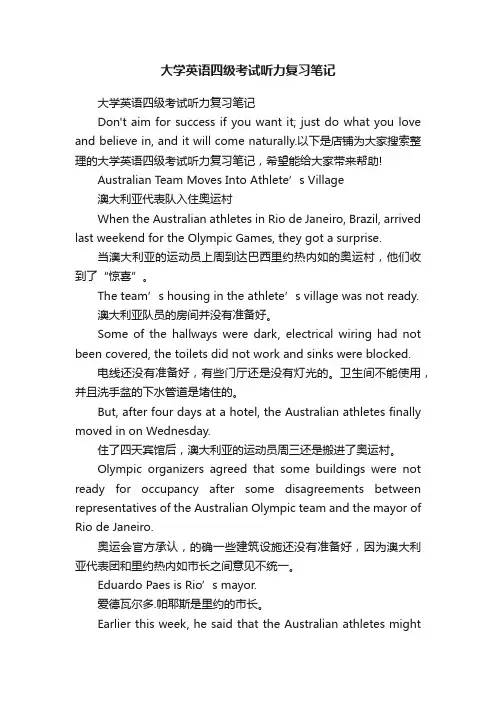
大学英语四级考试听力复习笔记大学英语四级考试听力复习笔记Don't aim for success if you want it; just do what you love and believe in, and it will come naturally.以下是店铺为大家搜索整理的大学英语四级考试听力复习笔记,希望能给大家带来帮助!Australian Team Moves Into Athlete’s Village澳大利亚代表队入住奥运村When the Australian athletes in Rio de Janeiro, Brazil, arrived last weekend for the Olympic Games, they got a surprise.当澳大利亚的运动员上周到达巴西里约热内如的奥运村,他们收到了“惊喜”。
The team’s housing in the athlete’s village was not ready.澳大利亚队员的房间并没有准备好。
Some of the hallways were dark, electrical wiring had not been covered, the toilets did not work and sinks were blocked.电线还没有准备好,有些门厅还是没有灯光的。
卫生间不能使用,并且洗手盆的下水管道是堵住的。
But, after four days at a hotel, the Australian athletes finally moved in on Wednesday.住了四天宾馆后,澳大利亚的运动员周三还是搬进了奥运村。
Olympic organizers agreed that some buildings were not ready for occupancy after some disagreements between representatives of the Australian Olympic team and the mayor of Rio de Janeiro.奥运会官方承认,的确一些建筑设施还没有准备好,因为澳大利亚代表团和里约热内如市长之间意见不统一。
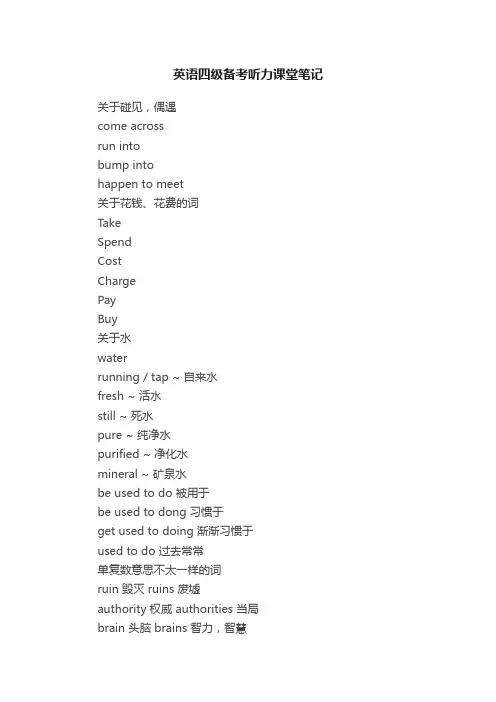
英语四级备考听力课堂笔记关于碰见,偶遇come acrossrun intobump intohappen to meet关于花钱、花费的词TakeSpendCostChargePayBuy关于水waterrunning / tap ~ 自来水fresh ~ 活水still ~ 死水pure ~ 纯净水purified ~ 净化水mineral ~ 矿泉水be used to do 被用于be used to dong 习惯于get used to doing 渐渐习惯于used to do 过去常常单复数意思不太一样的词ruin 毁灭 ruins 废墟authority 权威 authorities 当局brain 头脑 brains 智力,智慧custom 风俗习惯 customs 海关damage 破坏,损坏 damages 赔偿费ground 地面土地 grounds 院子,监狱manner 礼貌方式 manners 外貌minute 分钟 minutes 会议记录paper 纸张 papers 试卷time 时间 times 时代关于“调查”researchsurvey 市场调查opinion poll 名义调查民意调查questionnaire 问卷调查investigation 很正式的调查interview 会见,访谈belong to 属于participate in 参加be engaged in 从事、参加be involved in 卷入[备考听力课堂笔记]。
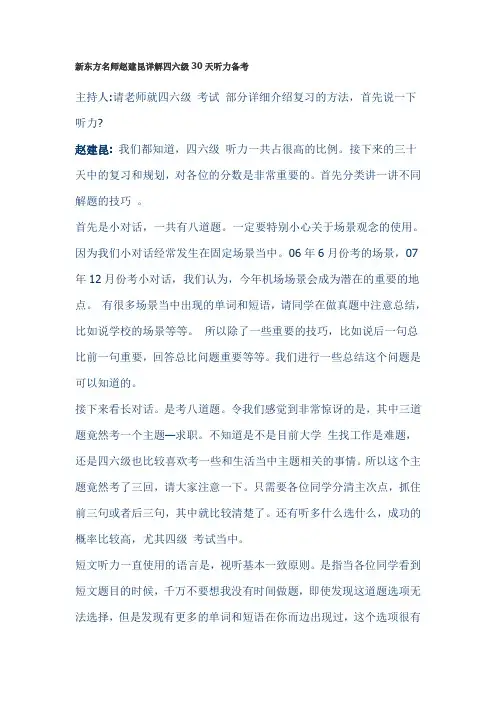
新东方名师赵建昆详解四六级30天听力备考主持人:请老师就四六级考试部分详细介绍复习的方法,首先说一下听力?赵建昆:我们都知道,四六级听力一共占很高的比例。
接下来的三十天中的复习和规划,对各位的分数是非常重要的。
首先分类讲一讲不同解题的技巧。
首先是小对话,一共有八道题。
一定要特别小心关于场景观念的使用。
因为我们小对话经常发生在固定场景当中。
06年6月份考的场景,07年12月份考小对话,我们认为,今年机场场景会成为潜在的重要的地点。
有很多场景当中出现的单词和短语,请同学在做真题中注意总结,比如说学校的场景等等。
所以除了一些重要的技巧,比如说后一句总比前一句重要,回答总比问题重要等等。
我们进行一些总结这个问题是可以知道的。
接下来看长对话。
是考八道题。
令我们感觉到非常惊讶的是,其中三道题竟然考一个主题—求职。
不知道是不是目前大学生找工作是难题,还是四六级也比较喜欢考一些和生活当中主题相关的事情。
所以这个主题竟然考了三回,请大家注意一下。
只需要各位同学分清主次点,抓住前三句或者后三句,其中就比较清楚了。
还有听多什么选什么,成功的概率比较高,尤其四级考试当中。
短文听力一直使用的语言是,视听基本一致原则。
是指当各位同学看到短文题目的时候,千万不要想我没有时间做题,即使发现这道题选项无法选择,但是发现有更多的单词和短语在你而边出现过,这个选项很有可能就是你的答案。
相信只要做过一些真题的同学,你总结一下这两年短文听力当中,那些准确选项对应的原文,你就会发现,经常就是我们前端中端尾端出现的单词。
还有复合听力的问题。
首先是八个单词这样的学习。
如果你希望在八个单词上出个好的成绩。
我可以给你一个标准,如果你没有问题的话,就可以得一两分了。
2000—2007年所有真题当中听力考试当中选项和听力单词当中,你都会听写,这个不是很难的部分。
所有考试当中,听力部分的词汇更生动化一些,所以这样的东西,复习起来难度不会很大的。
现在看一下句子。
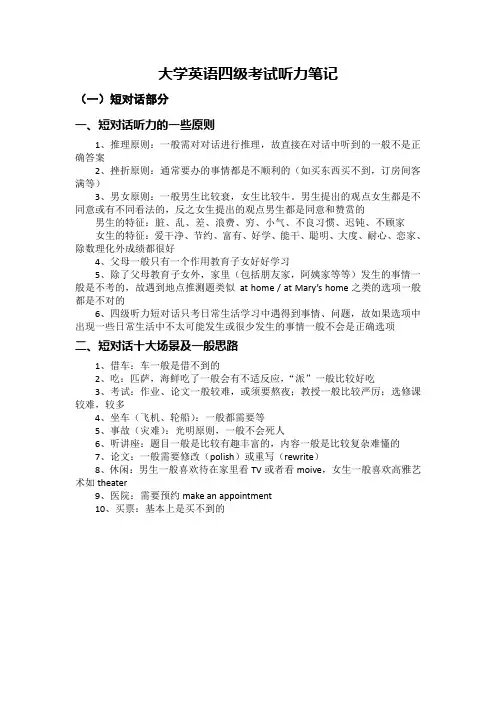
大学英语四级考试听力笔记(一)短对话部分一、短对话听力的一些原则1、推理原则:一般需对对话进行推理,故直接在对话中听到的一般不是正确答案2、挫折原则:通常要办的事情都是不顺利的(如买东西买不到,订房间客满等)3、男女原则:一般男生比较衰,女生比较牛。
男生提出的观点女生都是不同意或有不同看法的,反之女生提出的观点男生都是同意和赞赏的男生的特征:脏、乱、差、浪费、穷、小气、不良习惯、迟钝、不顾家女生的特征:爱干净、节约、富有、好学、能干、聪明、大度、耐心、恋家、除数理化外成绩都很好4、父母一般只有一个作用教育子女好好学习5、除了父母教育子女外,家里(包括朋友家,阿姨家等等)发生的事情一般是不考的,故遇到地点推测题类似at home / at Mary’s home之类的选项一般都是不对的6、四级听力短对话只考日常生活学习中遇得到事情、问题,故如果选项中出现一些日常生活中不太可能发生或很少发生的事情一般不会是正确选项二、短对话十大场景及一般思路1、借车:车一般是借不到的2、吃:匹萨,海鲜吃了一般会有不适反应,“派”一般比较好吃3、考试:作业、论文一般较难,或须要熬夜;教授一般比较严厉;选修课较难,较多4、坐车(飞机、轮船):一般都需要等5、事故(灾难):光明原则,一般不会死人6、听讲座:题目一般是比较有趣丰富的,内容一般是比较复杂难懂的7、论文:一般需要修改(polish)或重写(rewrite)8、休闲:男生一般喜欢待在家里看TV或者看moive,女生一般喜欢高雅艺术如theater9、医院:需要预约make an appointment10、买票:基本上是买不到的三、短对话的常见场景1、学校场景课程分类Optional course 选修课Required course 必修课Day course 白天的课Evening course 晚上的课经常出现的科目或专业Chinese 中文English 英语Mathematic 数学History 历史Chemistry 化学Literature 文学考试Final exam 期终考试middle exam 期中考试make up 补考test测验pop test 事先没有说好的测验quiz 测验oral test 口试考试临近draw onin sight ofdraw nearly考试延期或取消delaybe offdeferhold uppostponeput offsuspend 学校分类public school 公立学校private school 私立学校religious school 教会学校学校中的人president 校长dean 院长professor 教授lecturer 讲师coordinator 管理员doctor 博士master 硕士bachelor 学士freshman 大一新生sophomore 大二学生junior 大三学生senior 大四学生图书馆借书lend / borrow / check out参考书reference book续借renew过期overdue还书return罚金fineattend / have a lecture 上课cut a class 逃课miss a class 错过了课scholarship 荣誉奖学金assistantship 助教奖学金teaching assistant 助教research assistant 助研semester 学期2、交通运输场景fare 车票licence 驾照rush hours 高峰时间traffic jam 交通堵塞overtake 超车one way street 单行道over speed 超速police officer 交警ticket 罚单fine 罚金fast way / express way / high way 高速公路motor way 机动车道super way 飞机机动车道free way 免费高速公路交通工具(出现频率从高到低)plane / train(女)/ bus / bike(女)/ walk(女)/ taxi (女):女生比较喜欢tunnel / channel 隧道ring road 环线subway(美)/ underground (英)地铁metro 地道地铁underpass人行地道overhead 轻轨flyover 人行天桥mag –lev 磁悬浮take a taxi 乘出租车call a taxi 招出租车/订出租车catch a train / bus 赶火车/汽车3.电话场景mobile phone 手机pay phone 公用电话telephone box/booth 电话亭yellow page 黄页dial (拨电话号码)/ press (按电话号码)extension 分机operator 总机put~through 接通wrong number / there is no one by this name 电话号码错了/ 没有这个人is not in 不在?be not inhold on 不要挂断,稍等take/leave a message 留言hang up / get off 挂断credit call 记账式电话bill the call into the 3rd party 免费电话collect call 对方付费电话4.机场场景plane / craft 飞机book 订票timetable 时间表destination 目的地one way ticket 单程票round trip ticket 来回票non-stop / direct flight 直航transfer / lay over / stop over 转机first / business / economy cabin 头等/ 商务/ 经济舱confirm the flight 确认航班check in 登记boarding card 登机牌security check 安检see off 送行送别时的祝语keep in touch 保持联系safe landing 安全着陆board 登机take off 起飞departure 离港safety / sect belt 安全带land 着陆arrival 进港pick up 接机5.公司场景job vacancy 有空缺职位letter of application 求职信resume 简历resume包括几部分basic / personal info. 基本信息/个人资料academic background 教育背景work experience 工作经验certificates and honoursinterview 面试offer 聘用信work experience 工作经验work overtime 加班ask for a raise 加钱wage 周薪salary 日薪bonus奖金allowance 津贴annual income 年收入promotion 升职fire 解雇resign 辞职retire 退休work / job / career / course 工作post / position / vocation / title 职务假期休息的说法(依次是从大到小)holiday 假日,假期vacation 休假annual leave 年假sick leave 病假rest 休息break 指喝杯茶、喝杯咖啡的休息coffee breakaway 离开一会公司职位从大到小chairman of the boardpresident -- general manager—manager –department manager—head –officer –specialist(专员)-- clerk6.租房场景live on campus 住校live off campus 住校外for sale 可销售的房子for rent / lease 可出租的房子to let 同上rent 租金utilities 公用事业费location 位置suburb / downtown 市郊/ 市中心condition 住房条件furnished 配家具unfurnished 无装修leaking 漏水blackout 断电environment 环境transportation 交通land lord 房东land lady 房东太太tenant 房客roommate 室友好的室友:neat 整洁的considerate 体贴的,细心的不好的室友:messy / untidy 脏乱的noisy 吵闹的7.医院场景see a doctor 去医院看医生send for a doctor 让医生出诊health center / clinic 卫生所/ 门诊部physician 内科医生surgeon 外科医生dentist 牙医make an appointment 预约emergency 急诊check up / exam 检查cold(感冒)——flu (流感)——headache (头痛)——sore throat(嗓子痛)——fever(发烧)——toothache(牙疼)——stomachache (胃疼)prescribe 开药方pill / tablet 药片liquid 喝药水injection => shot 注射operation 手术medical result 诊断结果8.宾馆场景make a reservation 预订房间confirm a reservation 确认预订cancel a reservation 取消预订fully booked / full up / full 客满porter 行旅员tips 小费reception 前台check in 登记入住single room 单人房double room 一张大床的双人房twin room 两张单人床的双人房suite 套房bathroom toilet / w.c closet restroom 厕所room service 客房服务(四级听力中的客房服务一般只有考一种——送餐)lounge 男士用休息区lobby 大堂business center 商务中心salon 美容厅ball 舞厅bar 酒吧night club 夜总会check out 退房9.邮局场景post / send / mail 寄letter / mail 信registered mail 挂号信regular mail 平信airmail 航空信parcel / package 包裹telegram / cable 电报rate 费率overweight 超重postage 邮资email 电子邮件reply 回复forward 转发cc(carbon copy)抄送bcc(blind carbon copy)秘密抄送subject 主题attach 附件attachment10.饭店场景eat out 出去吃take away 外带fast food 快餐book a table 订位子waiter / waitness 服务员waitressmenu 菜单order 点菜appetizer 开胃菜main course 主食dessert 餐后甜点bill 账单service charge 服务费change 找零tips 小费keep the change 不用找零了11.其他closed 关门open 开门office hours / business hours / working hours 工作时间,营业时间关于开关power on / off 开/关turn on / off 开/关switch on / off 开/ 关(这个词只能用于与电有关的开关,不能用于水龙头之类的开关)干杯cheerspropose a toast tobottom upthe best book 最好的书圣经the best thing 最好的事情选择the last thing 最不愿意做的事情the last man 最不愿意见的人best seller 畅销的东西sell up 卖完,卖光售罄sell out卖完,卖光售罄/ 出卖朋友或原则sell off 低价处理库存商品selling machine 自动售货机selling point 卖点count the days 渴望count on = dependent / rely on depend oncount in 把……考虑在内count for nothing 一钱不值count for little 无足轻重count for much 举足轻重count down 倒计时count up 相加count up to 共计关于旅行traveljourney 陆上长途旅行trip 陆上短途旅行outing 远足stroll 散步wander 徘徊picnic 野餐camping 野营tour 周游cruise 水上短途旅行voyage 水上长途旅行关于死亡的说法没有感情色彩的:die / end up / meat one’s death / decease 褒义的:pass away贬义的:kick the bucket关于和别人相处的好的说法get on with = get along (well) withbe in good term withlive in peace with关于强调point outemphasizelay / put emphasis ongive emphasis to达成协议找到出路find a way outreach an agreementreach a consensus关于“得失”gains and lossesgive and take关于拜访drop in / at / over / bystop in / over / bycall on sbcall at / round swlook in / uppay a visit topay / make a call to关于碰见,偶遇come acrossrun intobump intohappen to meet关于花钱、花费的词Take Spend Cost Charge Pay Buy 关于水waterrunning / tap ~ 自来水fresh ~ 活水still ~ 死水pure ~ 纯净水purified ~ 净化水mineral ~ 矿泉水be used to do 被用于be used to dong 习惯于get used to doing 渐渐习惯于used to do 过去常常单复数意思不太一样的词ruin 毁灭ruins 废墟authority 权威authorities 当局brain 头脑brains 智力,智慧custom 风俗习惯customs 海关damage 破坏,损坏damages 赔偿费ground 地面土地grounds 院子,监狱manner 礼貌方式manners 外貌minute 分钟minutes 会议记录paper 纸张papers 试卷time 时间times 时代关于“调查”researchsurvey 市场调查opinion poll 名义调查民意调查questionnaire 问卷调查investigation 很正式的调查interview 会见,访谈belong to 属于participate in 参加be engaged in 从事、参加be involved in 卷入消磨时间kill timepass timecount one’s thumbs用完、缺少run out ofbe short ofbe lack in lack of / ina little 一点not a little 很多a bit 一点not a bit 一点也没有短对话中常用单词和句型1.表示期待、希望、渴望做某事的说法expect / hope / wishbe eager / anxious /dying tolook for ward towait / yean / thirst / long forcan not waitcounting the days2.下列词语与“but”一样含有转折的的意思actuallywellreallyin factas a matter of factto tell you the truth3.表示建议的句型how about……做……如何I heard about……我听说……If I were you ……如果我是你……It seems to me that……在我看来似乎……Let’s ……shall we ? 让我们……怎么样?Let us ……will you ? 让我们……怎么样?Shall I / we ……What about ……做……如何Why don’t you ……你为什么不……Why not + 动词原型为什么不……Would you like ……你要……吗?Wouldn’t ……be better / wiser 做……不是更好吗?4.表示同意、附和的句型I agree with youExactlyI couldn’t agree with you more / betterI think soI can’t wait any minuteBelieve it or notI will ……if 假如……我就会It’s my turn 轮到我了我请客Why not ?You are rightI guess so 我猜也是No problem 没问题Of causeOut of question 毫无疑问So do I / me too 我也是Sure / absolutely / beautiful 当然,很好Good ideaThat sounds really nice 听起来真不错5.表示询问的句型Any questions / any thing wrong 有什么问题吗?Can you give me some ideas 可以给我一些建议吗?Do you know ……Do you want to……Do you find any wrong with 你觉得……有什么不对劲吗?How long will it take 做什么要花多久I am thinking of ……我正在考虑做……I suppose think ……我猜想……What’s your plane plan 你的计划是什么?What happens if ……如果……怎么办?What shall we do 我们该怎么做?6.表示否定的句型Actually / as a matter of fact 事实上……How can you do sth 你怎么可以……I can’t afford any disturbance 不要再烦我I couldn’t agree with youI didn’t men to 我本不打算I don’t thin k soIt doesn’t matter 无所谓I wish ……但愿……I’d like to but 我很愿意但是……I’d love to butI just can’t bearI am afraid notI am sorry but……is not everything ……不是关键no bother / why bother 不要麻烦no , thanksreallyThat’s his opinionTo tell you the truthWell , as far as I know7.表示“不得不”have to 表示客观上不得不做某事must 主观上的必须做某事be bound tocannot buthave no choice but8.表示“迟到”behind timebe delayed / overduebehind schedulebe late9.表示“紧张”trembleshake all overget one’s tongue tiedhave one’s mind go bl anknervous10.以下词组听到后意思取反mean to 想要……planned to 原计划……intended to 原打算……tended toused to 过去常常……11.以下句型要引起重视,重点听取,就算本身不是考点也一定直接引向考点反意疑问句( ……,didn’t you ?)反问句倒装句助动词do / did / doesit is ……that / who / when……的句型正确答案的特征1.含义肯定的不是正确选项,模糊的是正确选项意思具体的不是正确选项,概括的是正确选项意思详细的不是正确选项,抽象的是正确选项意思肤浅的不是正确选项,深刻的是正确选项2.含有一下单词的一般是正确选项neither / either / also / besides / almost / especially / possibly / probably / likely perhaps / might / may / maybe / could /can / all / none3.含有以下三种结构的一般可能是正确选项系表结构(系动词+标语表语)比较结构(……than……)复合句4.含有四级词汇替换项的一般是正确选项5.表示“同意或不同意”,“喜欢或不喜欢”,“应该或不应该的”的一般为正确选项6.以下三种选项一般其中有一个可能是正确选项反意项形似项近似项7.同意项不可能是正确选项,等例排除。
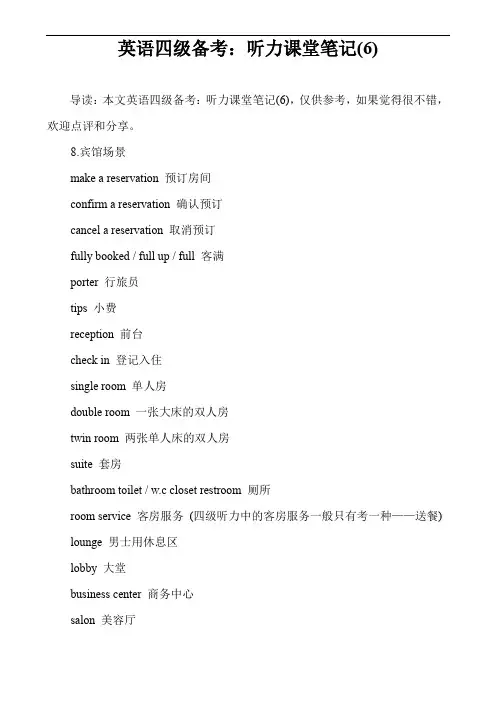
英语四级备考:听力课堂笔记(6)导读:本文英语四级备考:听力课堂笔记(6),仅供参考,如果觉得很不错,欢迎点评和分享。
8.宾馆场景make a reservation 预订房间confirm a reservation 确认预订cancel a reservation 取消预订fully booked / full up / full 客满porter 行旅员tips 小费reception 前台check in 登记入住single room 单人房double room 一张大床的双人房twin room 两张单人床的双人房suite 套房bathroom toilet / w.c closet restroom 厕所room service 客房服务(四级听力中的客房服务一般只有考一种——送餐) lounge 男士用休息区lobby 大堂business center 商务中心salon 美容厅ball 舞厅bar 酒吧night club 夜总会check out 退房9.邮局场景post / send / mail 寄letter / mail 信registered mail 挂号信regular mail 平信airmail 航空信parcel / package 包裹telegram / cable 电报rate 费率overweight 超重postage 邮资email 电子邮件reply 回复forward 转发cc(carbon copy) 抄送bcc(blind carbon copy)秘密抄送subject 主题attach 附件attachment。
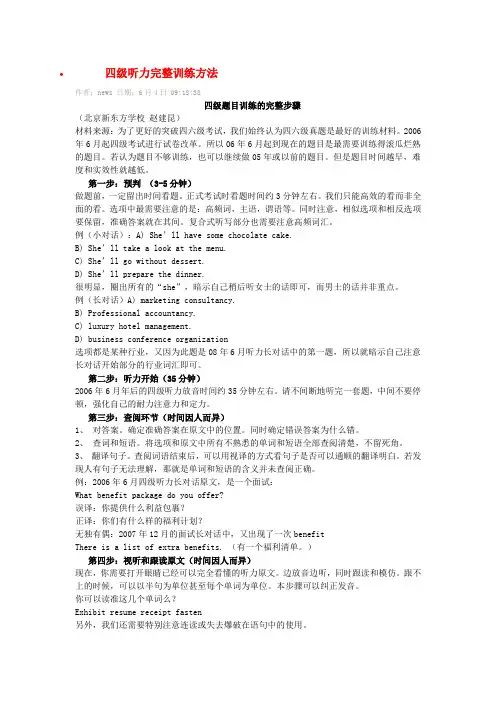
四级听力完整训练方法作者:news 日期:6月4日 09:18:38四级题目训练的完整步骤(北京新东方学校赵建昆)材料来源:为了更好的突破四六级考试,我们始终认为四六级真题是最好的训练材料。
2006年6月起四级考试进行试卷改革。
所以06年6月起到现在的题目是最需要训练得滚瓜烂熟的题目。
若认为题目不够训练,也可以继续做05年或以前的题目。
但是题目时间越早,难度和实效性就越低。
第一步:预判(3-5分钟)做题前,一定留出时间看题。
正式考试时看题时间约3分钟左右。
我们只能高效的看而非全面的看。
选项中最需要注意的是:高频词,主语,谓语等。
同时注意,相似选项和相反选项要保留,准确答案就在其间。
复合式听写部分也需要注意高频词汇。
例(小对话):A) She’ll have some chocolate cake.B) She’ll take a look at the menu.C) She’ll go without dessert.D) She’ll prepare the dinner.很明显,圈出所有的“she”,暗示自己稍后听女士的话即可,而男士的话并非重点。
例(长对话)A) marketing consultancy.B) Professional accountancy.C) luxury hotel management.D) business conference organization选项都是某种行业,又因为此题是08年6月听力长对话中的第一题,所以就暗示自己注意长对话开始部分的行业词汇即可。
第二步:听力开始(35分钟)2006年6月年后的四级听力放音时间约35分钟左右。
请不间断地听完一套题,中间不要停顿,强化自己的耐力注意力和定力。
第三步:查阅环节(时间因人而异)1、对答案。
确定准确答案在原文中的位置。
同时确定错误答案为什么错。
2、查词和短语。
将选项和原文中所有不熟悉的单词和短语全部查阅清楚,不留死角。
赵建昆老师:英语四级听力三大绝技第一篇:赵建昆老师:英语四级听力三大绝技1各位备考英语四级的同学都知道,听力是四级考试中非常重要的一块儿内容,那么该如何复习四级听力呢?我们来听听赵建昆老师的讲解吧。
综合来说,四六级听力从技巧上,只考三项:1、视听一致(长对话和短文听力的中低难度题目)2、同义替换(对话和短文听力的剩余题目)3、听写(复合式听写)Short Conversations题目序号:11-18及格数量:5-6道推荐准确数量:6-7题重点主题:Campus life job-hutting重点场景:Restaurant hotel核心技巧:1、后句比前句重要,回答比提问重要2、若选项中个别单词或短语被明显播读,此项多为错项;同义词替换选项正确可能性大。
3、同义词替换(最保险考点)4、关注对话潜在规则:例如东西断货、房间爆满、考试失败、课程作业抱怨、交通工具迟到、邀约失败...例一:2010年12月A)her new responsibilities in the companyB)what her job prospects(前景)areC)what the customers’ feedback isD)the director’s opinion of her workKEY:DM: How’s the new job going?W: Well, I’m learning a lot of new things, but I wish thedirector would give me some feedback。
Q:What does the woman want to know?本题中,第二句为考点,feedback 直接换成答案的opinion,而C项的feedback是明显干扰。
例二:2009年12月第16题A)She must have paid a lot for the gym.B)She is known to have a terrific figure.C)Her gym exercise has yielded good results.(她的健身房练习取得好的结果)D)Her effort to keep fit is really praiseworthy.原文:W: I’ve been working out the gym since January.I was a bit out of shape.M: You look terrific.It seems that your effort has paid off.(你看起来棒极了,看来努力没有白费.)Q: What does the man imply about the woman?解析: 关注第二句,期间读到的单词全部在错项中有所体现。
名师辅导:考前二十天,冲击新四级听力名师辅导:考前二十天,冲击新四级听力名师辅导:考前二十天,冲击新四级听力北京新东方学校国内考试部赵建昆12月23日的四级考试就在眼前,听力部分作为分值最高,题型最多,难度最大的考试部分,在剩下短短的二十天内,值得各位再次卯足精力,认真准备。
也许我们无法决定结果,但是我们一定可以控制过程。
12月1日至5日:五天――词汇短语集合复习请先不要关注听力纷繁多样的题型,给你五天时间,(其中包含容易抓住也容易放掉的周六和周日)请你,将2000年1月到2006年6月24日中能够找到的所有约十五套左右四级真题全部找齐。
在网上下载是可行的方案。
但是通常都无法得到听力部分的原文。
所以,建议各位买一本真题练习册,一般的练习册都包含听力原文部分。
你需要:将所有听力题目(对话类、短文类听写类)、听力原文部分不懂的单词、短语、句式,全部查清楚,搞透彻。
听力的材料要比阅读等其它部分的材料难度小,所以,你会发现总结和查询的时间不会超过三四个小时。
而接下来几天的时间就需要你利用你的十八般武艺将他们记忆清楚。
最好的方式当然是用听的方式。
因为只有听过,听过的东西才真正是你的。
这五天进行的基础工作能够让你更好的应对新题目中的单词和短语,因为真题之间题目元素重合概率很高。
12月6日至10日:五天――对话类题目练习、听写类题目强化训练(一)新四级的听力部分包含短对话八题和长对话七题。
其中,短对话共8段,长对话共两段。
短对话类:请你仔细阅读一下2000年到2006年真题当中所有小对话的原文部分。
这些题目无外乎:数字时间类、对话地点类、人物职业关系类、动作类以及含义解释类。
其中,数字时间题目注意:听力过程中简单记录听到的数字以及听到的数字不是答案;对话地点题注意三大场景:机场、酒店、餐厅;人物职业关系题目注意五种关系的代表词汇,这五种关系分别是:医患关系、客户与服务员的关系(包含空姐和乘客等)、家属关系、同事同学关系、老板和秘书职员关系;动作类题目注意动作是如何被强调的;含义解释类题目注意陌生短语和惯用法的意思。
英语四级听力考试资料赵建昆available[E5veIlEbl] 待续的;有时间的;单身的;有货的redecorated重新装修;原型decorate[5dekEreIt]advertisedadvertise[5AdvEtaIz] 广告名词形式advertisement[Ed5v3:tIsmEnt]看选择题方式:1、找出结果不同的选项2、根据选项缩小信息提取范围contact[5k2ntAkt] 联系occasionally[E5keIVEnElI] 偶尔的regularly[5re^jJlElI] 规律的fare[feE] 费用regardless[rI5^B:dlIs] of[2v, Ev, v, f] the[Ti:, TI; TE, T] rates无论价格高低assignment[E5saInmEnt] 作业treat[tri:t] 请客inquire[In5kwaIE] 询问;咨询make[meIk] inquires about[5EbaJt] sth 询问某事inquiring[In5kwaIErIN] 好学好问的require[rI5kwaIE] 要求puzzle[5pQzl] 迷惑;迷crossword[5kr2sw3:d] puzzle[5pQzl] 字谜vocabulary[vE5kAbjJlErI] 词汇量keep[ki:p] in[In] touch[tQtF] with[wIT] 保持联络when[(h)wen] the[Ti:, TI; TE, T] rates are[B:, E] down[daJn] 50%降价的时候due[dju:] 到期plenty[5plentI] of[2v, Ev, v, f] 大量的traffic[5trAfIk] jam[dVAm] 堵车stick[stIk] 黏住be[bi:; bI] exposed[Iks5pEJzd] to[tu:; tE, tJ] 完全接触expose[Iks5pEJz] 暴露曝光在短对话中,被明显读到的单词的选项,经常是错误的选项;小对话中更容易出现答案的句子是第二句。
be[bi:; bI] thirsty[5W3:stI] for[fC:; fE] 饥渴于;希望得到promotion[prE5mEJFEn] 升迁;晋升devotion[dI5vEJFEn] 敬业work[w3:k] efficiency[I5fIFEnsI] 工作效率be[bi:; bI] fed[fed] up[Qp] with[wIT] sth/sb厌倦recruit[rI5kru:t] 招聘individually[IndI5vIdjJElI] 个人的ability[E5bIlItI] 能力negotiable[nI5^EJFjEbl]negotiate[nI5^EJFIeIt] 谈判前一个是:可以谈判的applicant[5AplIkEnt] 申请人travel[5trAvl] and[And; End, nd] social[5sEJFEl] security[sI5kjJErItI] 旅行和社会保险plus[plQs] 另加relocation[5ri:lEJ5keIFEn] expenses异地安置费长对话中,一般被明显播读的选项是正确的看选项是未必要翻译选项adopt[E5d2pt] 采纳;吸取;收养;(orpha孤儿);adopter收养人adoptee被收养人birth[b3:W] /natural[5nAtFErEl] /biological[ baIE5l2dVIkEl] parents生父母长对话、短文听力出题时遵循顺序出题原则,并且听到什么选什么长对话、短文听力千万不要等待问题出现后在答题(所听即所得)短对话类型一、人物关系题1、医患关系doctor[5d2ktE] 、patient[5peIFEnt] 、各种表示身体部位的词2、上下级关系i、老板和秘书boss[b2s] 、secretary[5sekrEtrI] 、fill[fIl] out[aJt] 、request[rI5kwest] form[fC:m]ii、经理和职员manager[5mAnIdVE] 、staff[stB:f] (除职员外还表示棍子)、The[Ti:, TI; TE, T]national[5nAFEnEl] flag[flA^] flew[flu:] at[At, Et] half[hB:f] -staffs。
国旗降半旗。
--stuff[stQf] 乱七八糟的小东西,填充hut[hQt] 小屋子、小房子--hat[hAt] 帽子3、客服关系H[eItF] 、A[E,eI] 、R[B:(r)] 即:hotel[hEJ5tel] 、airport[5eEpC:t] 、restaurant[5restEr:N, -r2nt]R[B:(r)] :waitress[5weItrIs] 女招待costumer[5k2stju:mE(r), k25stju:-]H[eItF] :costumer[5k2stju:mE(r), k25stju:-] 开房男hotel[hEJ5tel] clerk[klB:k; kl3:k] (receptionist[rI5sepFEnIst] )reception[rI5sepFEn] 前台A[E,eI] :take[teIk] off[C:f, 2f] passenger[5pAsIndVE] air[eE] hostess[5hEJstIs] 空姐(stewardress)--host[hEJst] 男主人steward[5stjJEd] 空哥flight[flaIt] attendant[E5tendEnt] 空中乘务员4、同级关系i、同学student[5stju:dEnt]classmate[5klB:smeIt]ii、同事colleague[5k2li:^]5、家属关系母子是最常考的夫妻是最常见的干扰项,一般不选二、地点关系(对话地点题)词汇:menu[5menju:] 、book[bJk] 、room[ru:m, rJm] 、reserve[rI5z3:v] 、check[tFek] in[In] 入住登记、办理入住登记手续balcony[5bAlkEnI] 阳台、包厢、包房、戏院、体育场steak[steIk] 牛排三、动作题1、情态动词类must[mQst; mEst]would[wJd, wEd, Ed, d]should[FJd, FEd, Fd]have[hAv] to[tu:; tE, tJ]had[hAd, hEd, Ed] better[5betE]+V原答案的形式security[sI5kjJErItI] office[52fIs]保安处switch[swItF] 转换、更改、开关+on[2n] 、off[C:f, 2f](一般会有同义转换2、建议动作类句型:why[(h)waI] don[d2n] ‘t you[ju:, jJ] do[dEJ] sth?why[(h)waI] not[n2t] do[dEJ] ……?how[haJ] about[5EbaJt] doing[5dJ(:)IN] ……?what[(h)w2t] about[5EbaJt] doing[5dJ(:)IN] ……?第二句是重点generous[5dVenErEs] 大方的--stingy[5stIndVI] 小气的decorate[5dekEreIt] 装修elegant[5elI^Ent] 优雅的involve[In5v2lv] 卷入;包括be[bi:; bI] keen[ki:n] on[2n] 热衷;关注于protective[prE5tektIv] 给予保护的inadequate[In5AdIkwIt] 不足够的equipment[I5kwIpmEnt] 设备panic[5pAnIk] 惊慌;恐慌ladder[5lAdE] 梯子;阶梯complicated[5k2mplIkeItId] 复杂的assumed[E5sju:md] 假设的portrait[5pC:trIt] 肖像;特征first[f3:st] thought[WC:t] 最初的想法rural[5rJEr(E)l] 乡村风味的urban[53:bEn] 城市的isolate[5aIsEleIt] 隔绝community[kE5mju:nItI] 社区typical[5tIpIkEl] 典型性的;代表性的;特征;特点复合式听写1、第一遍放音时单词部分尽量写出来2、第一遍放音时句子部分要听清主语3、第二遍把单词部分补充完整4、第二遍应该将句子听完想清楚之后再动笔5、第三遍检查时并弥补错失be[bi:; bI] bound[baJnd] to[tu:; tE, tJ]必然会……request[rI5kwest] form[fC:m] 申请表格staff[stB:f] 职员air[eE] hostess[5hEJstIs] 空姐receptionist[rI5sepFEnIst] 招待员indagate调查Campus[5kAmpEs] life[laIf] 校园生活on[2n] campus[5kAmpEs] 校内off[C:f, 2f] campus[5kAmpEs] 校外生活1、作业assignment[E5saInmEnt] 作业due[dju:] 到期paper[5peIpE] 论文essay[5eseI, 5esI] 论文(小论文)thesis[5Wi:sIs] 论文(毕业论文)booklist书单;书目=readinglistpresent[prI5zent] 目前;礼物presentation[7prezen5teIFEn] 演示;表达;呈现stay[steI] awake[E5weIk] 保持清醒book[bJk] report[rI5pC:t] 读书报告research[rI5s3:tF] report[rI5pC:t] 研究报告2、课程形式course[kC:s] 课程lesson[5lesn] 每一节小课class[klB:s] 班级;课程(教室这样一个主题)optional[52pFEnEl] course[kC:s] 选修课=elective[I5lektIv] course[kC:s] compulsory[kEm5pQlsErI] course[kC:s] 必修课compulsory[kEm5pQlsErI]education[7edjJ(:)5keIFEn] 义务教育require[rI5kwaIE] 要求requirement[rI5kwaIEmEnt] 要求;必修课seminar[5semInB:] 研讨会group[^ru:p] discussion[dIs5kQFEn] 团队讨论workshop[5w3:kF2p] 团队活动lecture[5lektFE] 大课--lesson[5lesn] 小课semester[sI5mestE] 学期=term[t3:m] 3、名称freshman大一sophomore[5s2fEmC:, -m2r] 大二junior[5dVu:njE] 大三senior[5si:njE] 大四the[Ti:, TI; TE, T] seniors,the[Ti:, TI; TE, T] weak[wi:k] ,the[Ti:, TI; TE, T] sick[sIk] ,the[Ti:, TI; TE, T] disabled[dIs5eIb(E)ld] and[And; End, nd] the[Ti:, TI; TE, T] pregnant[5pre^nEnt] 老弱病残孕妇graduate[5^rAdjJeIt, -dVJeIt] 毕业生;动词,毕业undergraduates本科生post[pEJst] -graduates研究生bachelor[5bAtFElE] 学士学位master[5mB:stE] 硕士学位doctor[5d2ktE] 博士学位postdocter博士后consult[kEn5sQlt] 咨询graduate[5^rAdjJeIt, -dVJeIt]school[sku:l] 研究生院tutor[5tju:tE] 导师;家教mentor[5mentC:] 良师益友;导师professor[prE5fesE] 教授instructor[In5strQktE] 讲师headmaster[hed5mB:stE(r)] 校长Hotel[hEJ5tel] 酒店1、定与预定reserve[rI5z3:v] 预定(及物)、reservation[7rezE5veIFEn] 、book[bJk] 另:reserve[rI5z3:v] 有保护区的意思2、房间single[5sIN^l] /double[5dQbl]room[ru:m, rJm] 单/双人间triple[5trIpl] room[ru:m, rJm] 三人间triple[5trIpl] w[5dQb(E)lju:] 网站中的wwwsuite[swi:t] [swi:t]套房standard[5stAndEd] suite[swi:t] 标准间presidential[7prezI5denFEl] suite[swi:t] 总统套房occupancy[52kjJpEnsI] 房间--room[ru:m, rJm]occupancy[52kjJpEnsI] rate[reIt] 入住率短语:room[ru:m, rJm] service[5s3:vIs] 客房服务check[tFek] in[In] /out[aJt] 开房/退房Restaurant[5restEr:N, -r2nt] 餐厅1、点菜order[5C:dE] menu[5menju:] winelist酒单alcohol[5AlkEh2l] 酒(白酒)alcohol[5AlkEh2l] abuse[E5bju:z] 酗酒drink[drINk] --beverage[5bevE rIdV] 饮料2、买单check[tFek]the[Ti:, TI; TE, T] bill[bIl] ,please[pli:z] ?treat[tri:t] 请客I[aI] treat[tri:t] you[ju:, jJ] 。